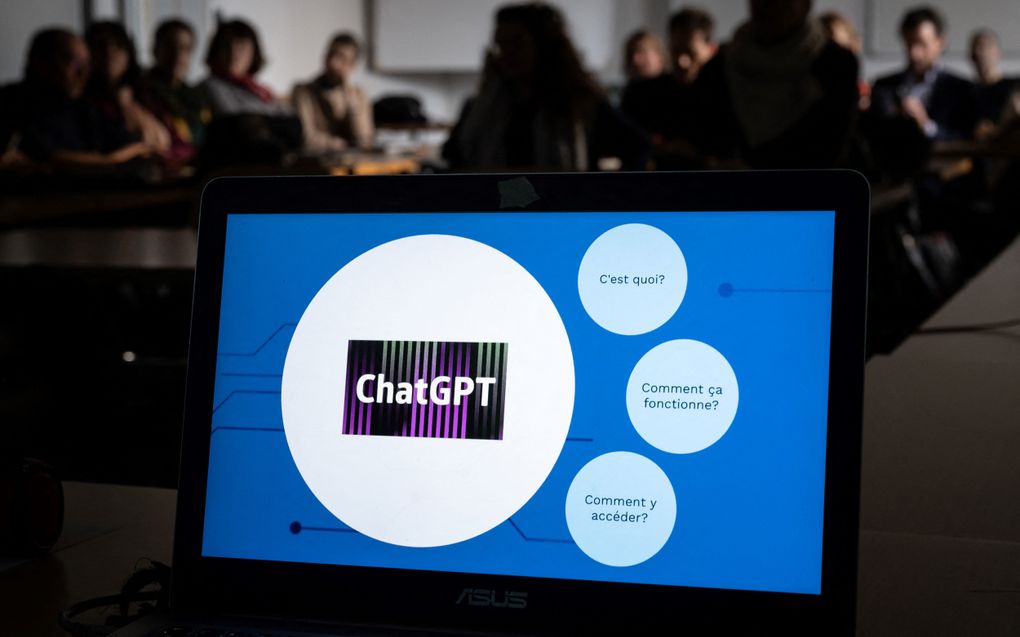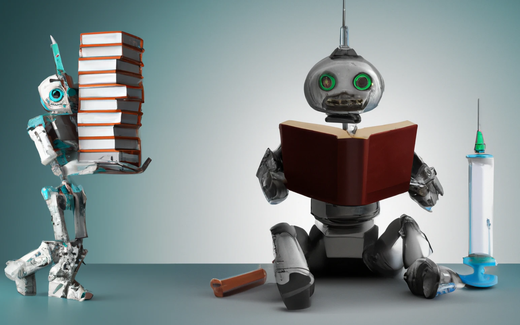Artificial intelligence's influence is growing in church

Photo AFP, Fabrice Coffrini
European Union
Artificial Intelligence is rapidly gaining influence in today’s society. But how should churches deal with these technological developments?
Most people have heard of it, and many have tried: ChatGPT. The recently launched chatbot answers all your questions. Whether you want to know the name of the Downing Street cat (Larry), the height of the Eiffel Tower (324 metres) or the answer to more complex questions, such as the differences between the Russian and Ukrainian Orthodox church, ChatGPT knows it all. Studies still have to determine whether the chatbot is biased.
ChatGPT works based on Artificial Intelligence or AI. This means that the programme acts autonomously and thus makes its own output decisions. A recent report from Stanford University shows that AI research has been heating up for years. In recent years, the growth of AI models has increased, with no end in sight.
Subtitles
In churches, AI tools are also increasingly being used. Take the Filadelfia church in Stockholm, for example. During the pandemic, this church, like most churches, began live streaming its service. But to make the sermons available to more people, the church started broadcasting automatic subtitles in over fifty languages.
The tool that provides these subtitles works on AI. It listens to the preacher and turns the spoken word into subtitles. The more services the software is fed with, the more it understands the type of words and contexts used.
According to the people behind the initiative, interviewed in the Swedish Christian daily Dagen, there are people from the United States and several African countries watching the services. Although it is a pilot project, the initiators are optimistic about the results. “We plan to continue until Jesus returns. Or at least as long as we do online TV. We are constantly developing it to be useful for more congregations that need subtitles for their services.”
Pastoral
But artificial intelligence can also go a step further. The German Protestant theologian Rainer Bayreuther would like the churches to be more open in dealing with artificial intelligence (AI). He suggests that ChatGPT could help pastors in writing sermons or templates for pastoral conversations. The Austrian Christian news website Religion.orf writes about this.

Especially in difficult conversations, ChatGPT can help, Bayreuther believes. “It’s about overcoming uncertainties, assessing wishes and fears, and including many aspects. Suppose you see pastoral care as a task to shape an uncertain future. In that case, the result can only get better if you include as many experiences and perspectives as possible.” However, Bayreuther warns scruples are appropriate. You should not leave all communication to the machine.
Bayreuther has the impression that churches have taken the pandemic as a wake-up call to “get up to speed with the times when it comes to digitisation”. You should remain courageous in this area, according to Bayreuther. He expects “that the church of the future will be much more volatile, that it will reinvent itself with every new quantum leap in technology. This is not tragic - on the contrary. It only has a chance of surviving if it reinvents itself.”
Cautious
Dr. Gernot Meier is more cautious. He agrees that churches need to deal with AI, but also says that digitisation is “reforming the human concept.” Structures aimed at standardisation could be created with AI, he says, pointing to the Instagram algorithm, which shows fit bodies. Many people are vulnerable to such images, he says to IDEA. “But for the Christian image of man, the difference is a great asset: “Man is the image of God, but God has many images, and it is not just the optimised human being or the optimised standardised life”.
From an ethical point of view, AI also raises questions of familiarity, reliability and trust. Meier gives an example: “These days, doctors have to justify if they disagree with the diagnosis made by AI. Do we put our trust in physicians, who can make mistakes, or do we completely rely on AI?”
Related Articles







